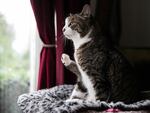There's this idea that cats are aloof, that they rely on their owners for food and snuggles but could basically take us or leave us.
Turns out that’s not true. How do we know? Science.

File photo of KeeKee, a cat who lives with her owner in Troutdale. New research from Oregon State University indicates cats feel attachment to humans similar to the ways dogs do.
Alan Sylvestre / OPB
New research from the Human-Animal Interaction Lab at Oregon State University shows that cats form attachments to their owners in ways similar to dogs — and even babies.
Their findings are laid out in a study published in Current Biology. Kristyn Vitale is the lead author of the study and she joined OPB "Morning Edition" host Geoff Norcross recently to talk about her work.
Here are highlights from their conversation:
Vitale and other researchers tested more than 100 cats and kittens.
“What we did was bring the cats and their owners into our lab at Oregon State; this was a room they had never been in before, so it was totally unfamiliar to them. For two minutes, we just let the cat and owner be in the room together. And then after that, the owner actually leaves the room and the cat is alone for two minutes. That two-minute alone phase is a potentially mild stressor for the cat, and it allows the potential attachment behavior to be heightened. Then we can observe if any attachment behavior is directed towards that owner when they return.”
The test subject cats were very pleased to see their humans.
“When the owner comes back, they'll go to the owner and greet them, and then they'll display this contact exploration balance: They'll periodically go back to the owner for attention and then go explore the room, explore the toys, and then go back to the owner.”
That secure attachment? We see the same thing in dogs and babies.
“We do know that attachment is a biologically relevant behavior. It acts in ways that increase the survival of that individual. So there are certain aspects of that secure attachment that could increase the likelihood that that animal is going to live and survive. And it's showing that this might be something common between many of these species.”
So maybe the difference between dogs and cats is all in our minds?
“Cats are more independent in the way that we don't have to train them to use the litter box the same way we have to house break a puppy. But that doesn't necessarily mean they don't use us as a source of security and that they aren't affectionate towards people. That's what we're finding: The majority of cats do use their owners as a source of security and rely on them for comfort.
Vitale used her own cats as guinea pigs.
“I did have them come in and participate, and I actually have … two secure cats, one insecure-ambivalent and one insecure-avoidant. It didn’t change how bonded I was to any of them, seeing that. But it did help me look at them a little differently, especially the insecure individuals. They might need extra attention or extra comfort if they're stressed because they might not be able to cope with it as well as the secure cats.”
To listen to the entire conversation, use the audio player at the top of this story.
